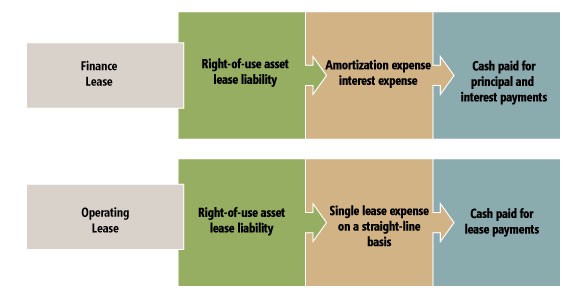
ASC Topic 842 Leases Overview
- Published
- Apr 3, 2019
- By
- Mark Sabates
- Share
The Financial Accounting Standards Board (FASB) issued ASC Topic 842, a new lease accounting standard that fundamentally changes the accounting guidance governing substantially all leases, including equipment and real estate leases.
The goal of ASC Topic 842 changes are to increase transparency and comparability among organizations by recognizing lease assets and lease liabilities on the balance sheet and disclosing key information about leasing arrangements.
FASB’s new standard will likely have far-reaching implications for corporate areas and functions such as accounting, finance and reporting, real estate, tax and technology.
Some Key Changes to Lease Accounting in ASC 842
The new standard significantly changes lessee accounting for leases and impacts presentations of financial statements as well as certain financial metrics, including those directly relating to debt covenants or other guarantees.
Key changes under ASC 842 will include:
- The definition of what constitutes a lease has changed.
- For lessees, all leases longer than 12 months will be recognized on the balance sheet as either an operating or finance lease.
- Classification as either and operating lease or finance lease will have differing impacts on Statements of Income and Cash Flow.
- Lessees must apply certain criteria to determine whether leases include lease and one or more non-lease components which should be allocated for separately.
- Accounting for sale-leaseback transactions will change substantially and will interplay with the revenue recognition requirements under ASC 606. Financial statement disclosure requirements are enhanced.
Impact to Lessee Accounting Treatment. Source: FASB in focus, ASU No. 2016-02.

Potential Implementation Issues
Implementing ASC 842 poses several challenges for companies, including:
- Being able to extract data for currently classified operating leases and record the lease on the balance sheet.
- Identifying contracts that meet the new definition of a lease and then be able to extract the data and record the lease on the balance sheet.
- Particularly on the heels of the adoption of ASC 606 for revenue recognition, companies may have limited resources to develop a reasonable timeline for adopting ASC 842.
ASC 842 Lease Accounting Effective Dates
| PUBLIC COMPANIES | ALL OTHER ENTITIES | |
| EFFECTIVE DATE | Fiscal and interim years within those years beginning after December 15, 2018. | Fiscal years beginning after December 15, 2019, and interim periods within those fiscal years beginning after December 15, 2020. |
| INTERPRETATION | For calendar year SEC registrants, adoption date is January 1, 2019, and retrospective application to annual and interim 2018 and 2017 financial statements. | For calendar year non-SEC companies, adoption date is January 1, 2020, and retrospective application to annual and interim 2019 and 2018 financial statements. |
| EARLY ADOPTION | Adaption allowed upon FASB issuance. Early adoption permitted only on or after the adoption of ASC 606 revenue recognition standard. | |
First Steps Towards ASC 842
Compliance surveys show that many companies are just beginning to assess the impact of ASC 842 and start the implementation process. Below are important initial steps.
- Understand that the definition of a lease has fundamentally changed. Under current GAAP, determining whether a lease is on or off the balance sheet is relatively straight forward and leases can be structured in order to achieve either outcome. Under ASC Topic 842 leases, all contracts meeting the definition of a lease will be presented on the balance sheet, even if the lease meets the criteria of an operating lease.
- Evaluate how the new rules could impact existing leases, current agreements that were not previously considered a lease, and of course any new lease agreements.
- Determine as early as possible whether the company has the resources and technology to capture all necessary data.
- Assess the impact on internal control processes.
What's on Your Mind?
Start a conversation with Mark
Receive the latest business insights, analysis, and perspectives from EisnerAmper professionals.











